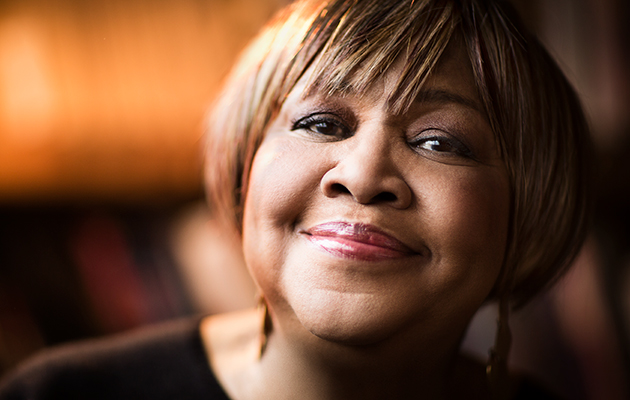Order the latest issue of Uncut online and have it sent to your home!
Originally published in Uncut’s March 2016 issue
At the age of 76, and after 65 years of performing, Mavis Staples can hardly believe that she may only just be reaching her peak.
“Things have been happening for me lately,” she says, “that make me feel like being born all over again. I mean, at this time I should be thinking about retiring, but I’m thinking, ‘Hey, I’m just getting started.’”
After success with her family gospel and soul group, The Staple Singers, led by her father Roebuck ‘Pops’ Staples, and decades of strong solo work, Mavis Staples now feels revitalised by her new record, the M Ward-produced Livin’ On A High Note – including new songs by Nick Cave and Justin Vernon – and a forthcoming documentary about her life, Mavis!.
“I tell you, it’s a beautiful feeling. So my father is very proud right now. And I know he’s probably telling all the angels, ‘Yep, my daughter Mavis, she’s still at it.’”
_______________________________
The Staple Singers
Uncloudy Day
Vee-Jay, 1959
Following their early church performances, The Staple Singers were picked up by Vee-Jay to record a set of singles, soon compiled on this, their debut LP.
http://www.youtube.com/watch?v=i7V7OMw7tg8
MAVIS STAPLES: When we first started singing on our living room floor back in 1949, 1950, we weren’t doing it for a career, we were singing to amuse ourselves. We had done all of our homework and had nothing to do, so my father picked up his guitar and said, “We’re gonna sing.” And he started giving us things to sing that he and his sisters and brothers would sing when they were in Mississippi. And that was The Staple Singers. One night my aunt Katie came through and said, “Shucks, you guys sound pretty good. I believe I want y’all to sing at our church.” We were so happy to be singing someplace other than on the living room floor. And when we sang in her church, that was it – people liked us so much that they kept clapping us back. And Pops said, “Shucks, these people like us, we’ll have to go and learn some more songs.” And the rest is history. When we moved from the church to the studio, it was fine – we knew we weren’t in church then, and that we couldn’t have an audience in the studio. That’s when it became more serious. In church you were singing to a congregation, and you could get this spiritual feel from just being there. But what you do in the studio is you take your heart in there with you. You have to be very sincere in what you’re doing – you’re singing from your heart. When we first started, man, we would always be on the same microphone in the studio. We wouldn’t do a whole album, we would sing four songs, then The Spaniels would sing four songs, then Maceo Woods would do four songs. And those 12 songs would make the album. Then when we did our first whole albums, Uncloudy Day and Will The Circle Be Unbroken, we sang all the songs!
_______________________________
The Staple Singers
Freedom Highway
Epic, 1965
The Staples engage thrillingly with the Civil Rights movement on this live album, recorded at Chicago’s New Nazareth Church.
This was a live album, recorded in church. The title song refers to the [Civil Rights] march from Selma, Alabama to Montgomery, Alabama. And that was when they wouldn’t let us cross the bridge into Montgomery. That is all shown now in that movie, [2014’s] Selma. Pops wrote the lines “march of freedom’s highway… I’ve made up my mind and I won’t turn around”, and he started putting those verses in there. I still sing “Freedom Highway” today, because it’s still relevant. Sometimes I think I’m back in the 1960s, with what is going on today. So I keep freedom songs in my show, because they are still relevant – “Freedom Highway”, “Why Am I Treated So Bad”… People used to tell us, “You’re very political”, and we’d say, “That’s our way of getting it across, through a song.” Pops would say, “If you write for the Staples, then you gotta read the headlines, ’cause we wanna sing about what’s going on in the world. And maybe we can sing a song to try and fix it.” That was just our way of letting the world know that we, as black people, we got somebody on our side too, and you could hear it in a song. “Why Am I Treated So Bad” – Pops wrote that for the Little Rock Nine. There were nine black children trying to go to a school in Little Rock, Arkansas, and they would not let these children board the bus. Everyday they would walk with their books and their heads held high into a mob of white people throwing rocks at them, spitting at them and calling them names. It went on for so long that the governor of Little Rock, the mayor of Little Rock and the President of the United States said, “Let those children board that bus. Let them go to school.” And we were waiting around the television to see the kids board the bus. When they got ready to go to the bus, a policeman was standing there and he put his club across the door, wouldn’t let them board. And Pops said, “Why are they treating them so bad?”, and he wrote that song that night. It turned out to be Dr King’s favourite. We would sing before Dr King would speak, and he would always wanna hear that song.



